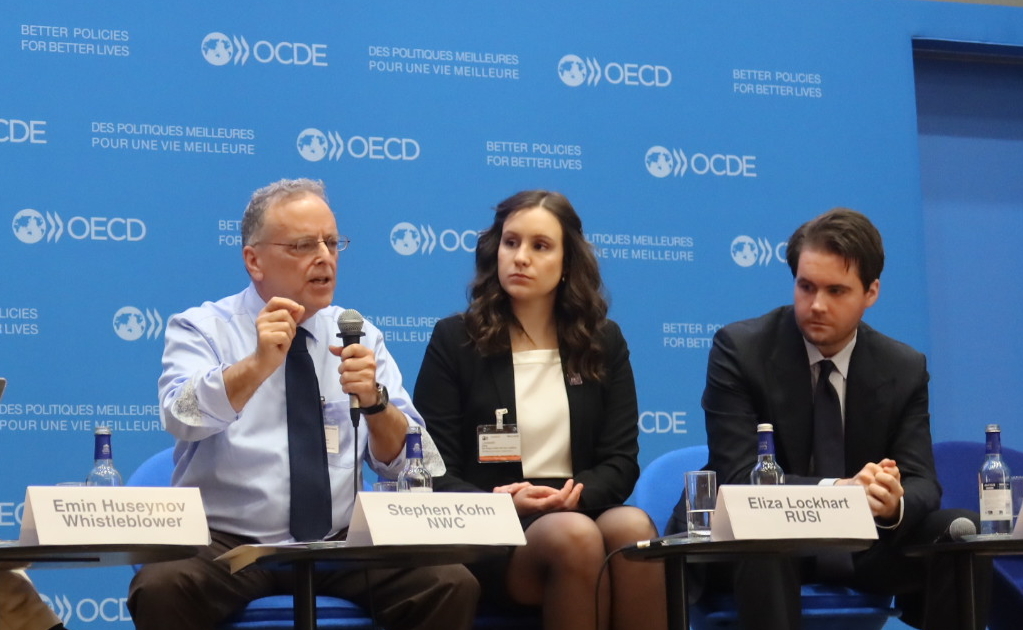Introduction
Corruption in Israel is an issue that affects various sectors, including public services, politics, law enforcement, and the judiciary. Experts say that the most affected area is within public services, where business leaders have paid bribes in exchange for access to certain public utilities.
Throughout history, Israel has witnessed many different types of corruption, including bribery, extortion, and embezzlement, as well as money laundering, among other illicit activities. This has led to mistrust in government and significant financial losses for some.
This guide will briefly touch on the history of corruption in Israel, and provide information to Israeli’s who can use strong and effective U.S. whistleblower laws to report such activities if the corruption involves U.S. publicly traded companies or individuals.
By understanding the status of corruption in Israel and these transnational whistleblower laws, Israeli whistleblowers can play an important role in combatting this global issue.
Brief History of Corruption in Israel
Corruption has been an issue in Israeli politics throughout its history. While Israel is generally considered a stable democracy with a strong legal system, instances of corruption have periodically surfaced, often leading to significant political and legal consequences.
In the early years of the state, corruption scandals related to land deals were common, which involved allegations of bribery, nepotism, and favoritism in the allocation of public land. Other scandals included the Dollar Account Affair (1977), Bar-On-Hebron Affair (1997), Greek Island Affair (1999), the Holyland Case (1996-2014), among many others.
Recent Cases: Benjamin Netanyahu
On November 21, 2019, Benjamin Netanyahu, who served as Israeli prime minister from 1996 to 1999 and again from 2009 until today, was indicted on charges of bribery, fraud, and breach of trust. The three cases related to this corruption are labeled Case 1000, Case 2000, and Case 4000.
Types of Corruption in Israel
The type of corruption that occurs in Israel varies, from bribery and extortion to embezzlement and money laundering. Below is a complete overview of the types of corruption taking place in Israel:
- Bribery: Bribery is the offering or accepting a financial or other benefit in exchange for favorable treatment. Current prime minister Benjamin Netanyahu has been accused of receiving bribes in exchange for providing favorable tax breaks to friends and lobbying on their behalf, promoting legislation that would stifle competition. There are multiple cases in which Netanyahu has been involved during his time as prime minister.
- Money Laundering: Money laundering refers to the disguising the source of illegally obtained funds. The Holyland Case is a prime example of high-profile corruption case involving top officials charged with both bribery and money laundering. Including former prime minister Ehud Olmert and former mayor Uri Lupolianski. In all, 10 of 13 involved in the Holyland Case were convicted, including the founder of the project.
- Tax Evasion: Tax evasion is a term used to describe someone who avoids paying taxes that are legally due. In 2020, Israel’s largest bank paid $900 million after admitting to helping U.S. customers evade taxes in illegal offshore bank accounts, in addition to laundering money in part of a bribery and kickback scheme paid to officials in FIFA.
- Embezzlement: Embezzlement refers to the misappropriation of funds or assets entrusted to an individual. In 2007, the Israeli Discount Bank was involved in a major embezzlement scandal. A bank employee embezzled millions of dollars over several years by transferring funds to offshore accounts. There have been instances of embezzlement involving government officials in Israel. These cases have raised concerns about corruption within the government and the need for stronger oversight measures.
- Procurement Fraud: Procurement fraud occurs when politicians manipulate public procurement processes for personal gain. This might involve bid-rigging, kickbacks, and false claims. An example can be seen with the “submarine affair,” which involved allegations of corruption in the procurement of submarines for the Israeli Navy. The scandal led to a major investigation and the resignation of the Israeli Defense Minister.
- Corruption in Public Sector: There have been numerous cases of corruption taking place in the healthcare sector, such as fraud in medical claims, drug procurement, and patient care. Also, within the procurement sector with construction projects, public works, and land acquisition, which involve overcharging, kickbacks, false claims, and cronyism.
These are the most identified types of corruption occurring in Israel right now. However, nepotism and cronyism also rank high, as preferential treatment is given to friends or associates, or relatives are appointed positions in which they are not qualified.
Efforts to Combat Corruption
There have been several anti-corruption efforts implemented in Israel, such as the development of stronger legal frameworks and transparency, to independent institutions, and international cooperation. Below is an overview of these efforts:
- Israel Police’s Lahav-433: Established in 2008 by then-Minister for Public Security, Avi Dicther, and the Head of Police’s Investigations Branch, Yohanan Danino, this is the Israeli crime-fighting organization within the Israeli Police whose purpose is to investigate crimes and corruption. There are several units within, including those dedicated to fraud, international crime, and financial crime.
- State Comptroller of Israel: This is an institution that oversees government activities and investigates allegations of corruption. It is also the government’s office for public complaints and has authority to examine all agencies of government.
- Transparency and Accountability: Efforts have been made to increase transparency and accountability in government operations, such as through public disclosure of financial information and access to government records.
- International Cooperation: Israel is cooperating with international organizations such as the OECD and the United Nations to combat corruption. The OECD Anti-Bribery Convention is a cornerstone to combat corruption; and being a signatory of this convention requires Israel (and other member countries) to criminalize foreign bribery.
It’s important to note that Israel is continuing to combat corruption, which remains a challenge. Criticism has been made about the effectiveness of such efforts, saying that the political system has hindered progress in this area.
For now, Israelis should look to the U.S. Continued cooperation from the U.S. has given Israeli’s a way to report foreign corruption and money laundering. Various U.S. whistleblower programs offer monetary awards and protection to whistleblowers whose information leads to a successful enforcement action.
Using U.S. Whistleblower Laws
Indonesians may be eligible for awards and protection under certain U.S. laws.
For instance, the if the information they provide pertains to corruption involving a U.S. publicly traded company and a political official of Indonesia, they can use the Foreign Corrupt Practices Act (FCPA). If the information provided relates to money laundering, they may also be eligible for awards and protection. Continue reading to learn more about these programs.
Foreign Corrupt Practices Act (FCPA)
The Foreign Corrupt Practices Act (FCPA) is a U.S. law that prohibits any U.S. company or individual from paying bribes to or receiving bribes from foreign government officials.
In other words, the FCPA prohibits the offer, payment, or promise to pay money or anything of value to a foreign official for the purpose of obtaining or retaining business. Companies must also retain accurate books and records and maintain a system of controls to prevent and identify improper transactions.
The Securities and Exchange Commission (SEC) offers whistleblower awards for individuals who provide original information that leads to a successful enforcement action involving the Foreign Corrupt Practices Act (FCPA). Companies who violate the Securities Exchange Act fall under this.
Awards can be substantial, often reaching millions of dollars. The SEC’s whistleblower program offers rewards of up to 30% of the monetary sanctions imposed in a successful enforcement action. To be eligible for a whistleblower reward, the information provided must be original and must lead to a successful enforcement action.
Anti-Money Laundering and Sanctions Whistleblower Program
Established by the U.S. Department of Treasury and enforced by the Financial Crimes Enforcement Network (FinCEN), This program awards individuals who provided original information leading to a violation of the Bank Secrecy Act (BSA) or US Patriot Act.
This program requires financial institutions, such as banks, to report suspicious activity they believe to be related to money laundering, terrorism, and other such activities. They are also required to establish and maintain an anti-money laundering program. Failure to report such activity can lead to fines and penalties.
Whistleblowers who have information of violations of the Bank Secrecy Act (BSA) can report their concerns to FinCEN and may be eligible for an award of up to 30% of the monetary sanctions imposed in a successful enforcement action.
Report Money Laundering
The FinCEN Anti-Money Laundering and Sanctions Whistleblower Program is an award program that incentivizes individuals to report violations of the Bank Secrecy Act (BSA) or sanctions violations. This includes money laundering, terrorist financing, recordkeeping violations, or failure to perform the proper Know Your Customer (KYC) checks.
Awards Under AML
Awards of between 10% and 30% are available to whistleblowers if the information they provided to FinCEN leads to a successful enforcement action. The percentage a whistleblower receives depends on numerous factors, including the quality of information provided and the role a whistleblower played in the investigation process. Awards are paid to whistleblowers out of the Financial Integrity Fund, which are funds collected entirely from sanctions.
Eligibility Under AML
The U.S. program can be used to report money laundering activities that have a connection to the United States, so it’s important to first understand the jurisdictional aspects of the case. Some other eligibility requirements to consider:
- The sanctions violation must exceed $1 million to become eligible for an award.
- Whistleblowers must report their concerns voluntarily, meaning, without force or coercion.
- Non-U.S. whistleblowers must hire a U.S.-based attorney when filing a claim.
- Whistleblowers must provide original information, which is information not already known.
If you are an Israeli or non-U.S. citizen, there may be other eligibility requirements. We suggest you consult with a U.S-based attorney first to understand whether you qualify.
Protections and Anonymity Under AML
Whistleblowers who report under this program are offered strong protections. However, given the jurisdiction of illicit activity, this can be limited. For instance, employers are prohibited from terminating, demoting, harassing, or acting negatively against an individual for reporting violations.
However, whistleblowers can report their concerns anonymously, shielding them from retaliation. If you have information about a money laundering scheme and would like to report it, we suggest keeping quiet and contacting an attorney immediately for legal assistance.
Learn More
Learn more about the Anti-Money Laundering and Sanctions Whistleblower Program and more about OFAC Sanctions Whistleblower Rewards.
Report Corruption and Bribery
The Dodd-Frank Wall Street Reform and Consumer Protection Act is a comprehensive piece of legislation that addresses a wide range of financial regulatory issues. The Act includes provisions that protect whistleblowers who report violations of federal securities laws, including The Foreign Corrupt Practices Act (FCPA). Dodd-Frank expanded the SEC’s authority to investigate and enforce violations of securities laws, which includes the FCPA.
FCPA is a law that prohibits U.S. companies from engaging in bribery to obtain or retain business. If a whistleblower witnesses a U.S. publicly traded company bribing an Israeli public official, they may be eligible for an award and protection under the FCPA and SEC Whistleblower Program. However, there are certain requirements that must be met.
Awards Under FCPA
Whistleblowers who provide the Securities and Exchange Commission (SEC) or the Department of Justice (DOJ) with original information may be eligible for an award of between 10 and 30 percent of the monetary sanctions collected in a successful enforcement action.
FCPA Eligibility
The Department of Justice (DOJ) and the SEC are both involved in enforcing the Foreign Corrupt Practices Act (FCPA) and administering the whistleblower program. To become eligible for an award under the FCPA, an individual must meet a few requirements:
- Whistleblowers must submit voluntary information, meaning the information must be provided to the authorities before they ask for it.
- Provide original information, which is independent knowledge or analysis the SEC or DOJ does yet know about or is not derived from publicly available sources.
- Provide information that contributes to a successful enforcement action. To become eligible for an award, the monetary sanctions must exceed the minimum of $1 million.
- Cooperate with the government throughout the investigation and subsequent legal proceedings, such as providing additional information when asked.
- Non-U.S. whistleblowers must hire a U.S.-based attorney when filing a claim under the SEC Whistleblower Program.
Whistleblowers can be one or more individuals. However, corporations, organizations, and private companies are not eligible to participate. The percentage a whistleblower receives under the SEC Whistleblower Program depends on several factors, which we urge you to review.
Protections and Anonymity Under AML
Like the AML program, under the Dodd-Frank Act, whistleblowers are protected against retaliation from their employer if they report violations of FCPA or securities laws under the SEC Whistleblower Program. Employers may not discharge, demote, suspend, harass, or in any way discriminate against an employee for blowing the whistle or assisting the government in an investigation.
Whistleblowers may submit their tips anonymously under the SEC Whistleblower Program. However, they must do so with a U.S.-based attorney. Furthermore, if you are a non-U.S. citizen, you are required to work with an U.S.-based attorney who can protect your identity, provide strong legal guidance, negotiate on your behalf, and maximize your award amount.
Learn More
Learn more about the Foreign Corrupt Practices Act (FCPA) and the SEC Whistleblower Program.
Other Laws
There are a few other laws potentially available to Israeli’s who would like to report their concerns. Whistleblowers may be able to use these laws in connection with a Related Action.
- IRS Whistleblower Program – Awards for Reporting Tax Evasion: The Internal Revenue Act provides awards to individuals who report violations of internal revenue laws or the underpayment of taxes. The scope includes money laundering. Awards range from 15% and 30% of the amount recovered.
- False Claims Act – Qui Tam Awards for Reporting Government Contract Fraud: This law allows individuals to sue on behalf of the government if they have information of individuals or entities knowingly defrauding the U.S. government. Award amounts range between 15% and 30% recovered from a qui tam lawsuit.
- CFTC Whistleblower Program – Awards for Reporting Commodities Fraud: This program is like the SEC Whistleblower Program, but instead of focusing on securities frauds, it focuses on manipulation or financial fraud taking place in commodities markets. Awards in this program range from 10% to 30% of the number of monetary sanctions collected.
To read about these laws in depth, we urge you to read Rules for Whistleblowers: A Handbook for Doing What’s Right (Lyons Press, 2023), written by founding partner Stephen M. Kohn. This is a step-by-step guide to the essential tools for successfully blowing the whistle, qualifying for financial rewards, and protecting yourself.
Conclusion
Corruption in Israel remains a persistent issue, affecting various sectors and undermining public trust. While the country has implemented anti-corruption measures, challenges persist, as evidenced by recent high-profile cases involving prominent political figures.
This guide has provided an overview of the history of corruption in Israel, the types of corruption prevalent in the country, and the efforts made to combat it. It has also highlighted the potential for Israeli whistleblowers to utilize U.S. whistleblower laws to report corruption involving U.S. companies or individuals.
By understanding the scope of corruption in Israel and the available avenues for reporting such activities, individuals can play a vital role in combating this global issue and promoting greater transparency and accountability.
Need Help? Contact Us
Want to report foreign corruption or money laundering?
Kohn, Kohn & Colapinto is led by world-renowned whistleblower attorney Stephen M. Kohn, who has guided clients to massive settlements, including the groundbreaking $104 million award case, involving Bradley Birkenfeld who exposed Swiss banking secrecy.
Also, our securities and commodities whistleblower group is led by former SEC Commissioner Allison Herren Lee and former SEC Enforcement Senior Counsel Andrew Feller, both are leading experts with deep knowledge in foreign corruption and securities-related matters.
We are the firm that clients hire when they are up against the world’s most powerful adversaries. Not only do we win, but we also help whistleblowers get the award they deserve for doing what’s right. Contact us today for a confidential consultation. We only get paid if we get an award for you.






